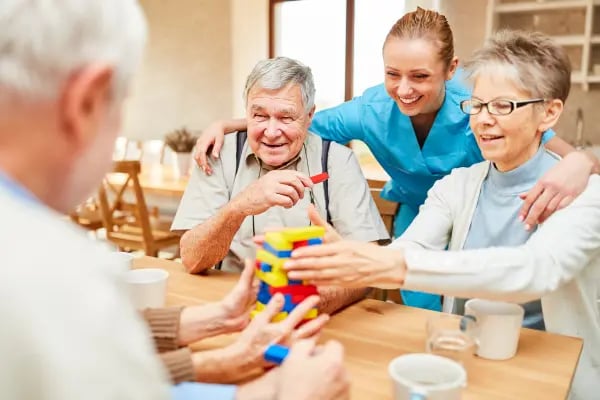Building Positive Relationships
In our journey towards wellness and health, one key element often stands out: relationships. Having positive, meaningful connections isn’t just fulfilling—it’s essential for mental and emotional well-being.
Lawrence Hobart
11/19/20243 min read


Welcome to the fourth installment of our general health series, brought to you by CareTec. In this series, we explore essential health topics that impact seniors and caregivers alike. As part of CareTec’s mission to harness the power of AI in monitoring and improving senior health, we aim to provide insights into recognizing and addressing health concerns early.
In our previous blog, “Recognizing Cognitive Decline: When Forgetfulness is a Red Flag,” we discussed the signs of cognitive decline versus normal aging and how they are crucial for early intervention and care. With advancements in AI, tools like those developed by CareTec can monitor changes in cognitive behavior, detecting patterns and declines early on.
Today, we’re shifting to a topic that might sound simple but can greatly impact overall health: relationships. Having positive, meaningful connections isn’t just fulfilling—it’s essential for mental and emotional well-being. Studies show that healthy relationships can boost our mood, reduce stress, and even improve our physical health. That’s why, in this blog, we’re exploring how small, everyday habits can strengthen your relationships and bring more warmth and positivity to your life.
These simple changes are like invisible bridges, helping you connect with others effortlessly. Here are seven tiny habits that can make people instantly like you, enhancing your sense of connection and support as you prioritize wellness in your life.
1) Letting Others Speak Without Interrupting. True connection begins with active listening. Instead of jumping in with your own thoughts, let others finish speaking. This simple act shows respect and makes people feel valued, sending the message, “I genuinely care about what you’re saying.” By giving others space to express themselves, you create meaningful conversations and build a foundation of mutual respect.
2) Fostering Positivity Positivity is a magnet for connection. When you focus on the brighter side of situations, you naturally uplift those around you, showing resilience and adaptability. Celebrating small wins, expressing gratitude, and speaking optimistically about the future makes others feel energized and motivated. In contrast, negativity can be draining and create emotional distance. By framing challenges constructively and highlighting solutions, you build an atmosphere where people feel hopeful and drawn to your presence.
3) Making Eye Contact (But Not Too Much). Eye contact is a powerful, non-verbal way of saying, “I’m here, and I’m listening.” It shows genuine engagement and interest, which can deepen trust and connection. Aim to hold eye contact for about 60% of a conversation. Too little may seem disinterested, but too much can feel intense or even off-putting. Strike a balance, occasionally glancing away, to make interactions comfortable and natural.
4) Asking About Others Engaging others by showing genuine curiosity about their lives fosters two-way conversations. Instead of focusing on your own experiences, ask open-ended questions, listen to their stories, and express empathy. This shows you’re invested in connecting rather than just sharing, making others feel valued and appreciated in the conversation.
5) Being Punctual Being on time is more than just a courtesy—it shows respect for others’ time. By consistently showing up on time, you demonstrate that you value their schedules as much as your own, which strengthens trust and reliability. Punctuality sends the message that you’re dependable and considerate, a small habit that builds lasting respect in relationships.
6) Following Through on Promises Trust is built on reliability. When you make a promise, commit to seeing it through. Consistently honoring your word fosters a sense of dependability, making people feel they can count on you. If circumstances prevent you from keeping a promise, communicate openly and take responsibility. This respect for commitments builds solid, lasting connections.
7) Expressing Gratitude Gratitude is a simple, powerful way to acknowledge others. Whether it’s a thank you for a small favor or recognition for a job well done, showing appreciation makes people feel valued. Practicing gratitude fosters positive relationships, turning interactions into moments of shared appreciation that deepen mutual respect and create lasting warmth.
By nurturing these small habits, you’re not just building better relationships—you’re also creating a healthier, more positive environment for yourself and others. And that’s what wellness is all about.
Disclaimer: This blog is for informational purposes only and should not replace professional medical advice, diagnosis, or treatment. If you or a loved one is experiencing stress, anxiety, or other emotional health concerns, please consult a healthcare provider for support.
Learn more about the author here.
©2025 CareTec.AI
Melbourne: 101 Collins St Melbourne VIC 3000 +613 9999 7379
Sydney: 2 Chifley Square, Sydney NSW 2000 +612 8880 0307
Queensland: 46 Cavill Ave, Surfers Paradise QLD 4217 +617 3667 7473
Texas: 200 W 6th St, Austin, TX 78701 +1 (737) 7101 776
London: 22 Bishopsgate, London EC2N 4AJ +44 (020) 4577 4024


